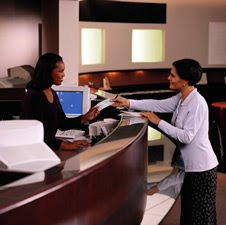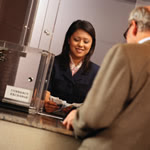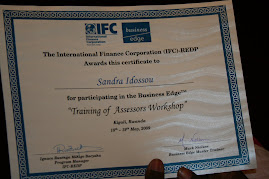With last week article on Courtesy, I had another reader who was concerned about standards of good grooming. Though we have in the past done an article on First Impressions, there is according to him, a real need to emphasize on grooming standards as unfortunately, many still neglect them. Apparently, James went to this bank on Friday and the service lady was dressed as if going to the night club. She had very tight jeans revealing her string. Probably, some of the male customers were happy for that free show but James wasn’t sure they all found her dressing professional. There was also this male cashier in sweatpants as if going to the gym. I know of this general rule of casual dress down on Friday but business owners need to define clearly to which extent their staff could go casual. Does casual mean shabby, dirty, untidy, torn, sexy, wrinkled, frayed or unprofessional? Traditionally, certain professionals such as bankers have to uphold the image that they are serious about their work, especially since their work involves handling customers’ money. Normally, clothing that are worn to go to the lake, the market, garden, nightclubs, exercise sessions, and sports are not always appropriate for a professional appearance especially in corporate and administrative companies. Courtesy as we described last week was everything that we do in using accepted and appropriate manners and behaviors towards people we dealt with. These manners are also seen in the way we are dressed and groomed. Her Majesty Queen Elizabeth says that “Dress gives one the outward sign from which people in general can, and often do, judge upon the inward state of mind and feelings.” Service people should know that good grooming accounts for 55% of impact on their first impression. It is therefore not just enough to have just a bath. Good grooming values our appearance and shows how courteous we are towards ourselves and other people. Below are some areas of Good Grooming standards that should not be neglected:  Body odor Body odor
This is a constant source of turning away potential customers.
 It is most often caused by improper hygiene; sometimes, it may just be a sickness that needs to be dealt with. If you have friends or colleagues who have this problem, do inform them as most a times, they’re usually the last ones to be aware of their smelling problems. It is most often caused by improper hygiene; sometimes, it may just be a sickness that needs to be dealt with. If you have friends or colleagues who have this problem, do inform them as most a times, they’re usually the last ones to be aware of their smelling problems.
 Bad breath Bad breath
This is another big issue!! Please take time to brush your teeth well. Remember the smell of coffee or cigarette is not always a pleasant one. Try to gargle and use frequently a breath freshener especially after lunch. Hair
Your Hair should be shampooed very often as this keeps it clear of dandruff. Men, your face must be clean shaven at all times and not only on Mondays. Ladies, please wash your braided hair frequently to prevent them from smelling especially if you keep those braids for a longer period.  Remember that untidy hair does not inspire any confidence or indicate a sense of orderliness. Remember that untidy hair does not inspire any confidence or indicate a sense of orderliness. Hands and nails
These should be clean, short and well cared for. Please ladies, make sure your nail polish is not peeled and chipped. It is better not to any nail polish than to have it half chipped off.
 Makeup and jewelry Makeup and jewelry  For those who wear makeup, this should be lightly applied. Your make up for the office should be different and lighter from the one you put on for a dinner party. Jewelry should be limited and discreet. For those who wear makeup, this should be lightly applied. Your make up for the office should be different and lighter from the one you put on for a dinner party. Jewelry should be limited and discreet.
Footwear 
You would be surprised at how many people judge you by your shoes!!! Your Shoes count for a lot in your outfit. Sloppy and scuffed shoes with worn heels will ruin the look of your outfit. Do go for comfortable shoes. Men need to wear good clean socks, polished and comfortable shoes. Please consider the color of the socks and match them to the color of your trousers. Dark trouser should go with dark socks. No white socks please! They are for tennis. Mickael Jackson’s white socks on a black pant are no more in vogue. Always remember that the more professional you are groomed, the more credible and competent you will appear to others. Good grooming manners are a sign of courtesy and respect towards yourself and others. Decide today to pay more attention to these little details and you will send positive good impressions of yourself and of your business. The author is a customer service expert currently working in Rwanda. sandra.idossou@sheiconsulting.com | 













 CEO PSF
CEO PSF






 Body odor
Body odor It is most often caused by improper hygiene; sometimes, it may just be a sickness that needs to be dealt with. If you have friends or colleagues who have this problem, do inform them as most a times, they’re usually the last ones to be aware of their smelling problems.
It is most often caused by improper hygiene; sometimes, it may just be a sickness that needs to be dealt with. If you have friends or colleagues who have this problem, do inform them as most a times, they’re usually the last ones to be aware of their smelling problems. Bad breath
Bad breath Remember that untidy hair does not inspire any confidence or indicate a sense of orderliness.
Remember that untidy hair does not inspire any confidence or indicate a sense of orderliness.  Makeup and jewelry
Makeup and jewelry  For those who wear makeup, this should be lightly applied. Your make up for the office should be different and lighter from the one you put on for a dinner party. Jewelry should be limited and discreet.
For those who wear makeup, this should be lightly applied. Your make up for the office should be different and lighter from the one you put on for a dinner party. Jewelry should be limited and discreet.
































